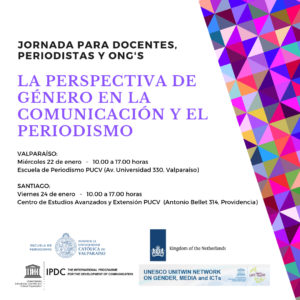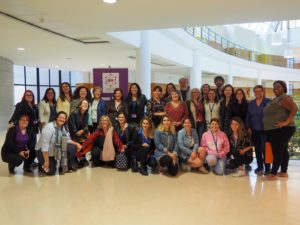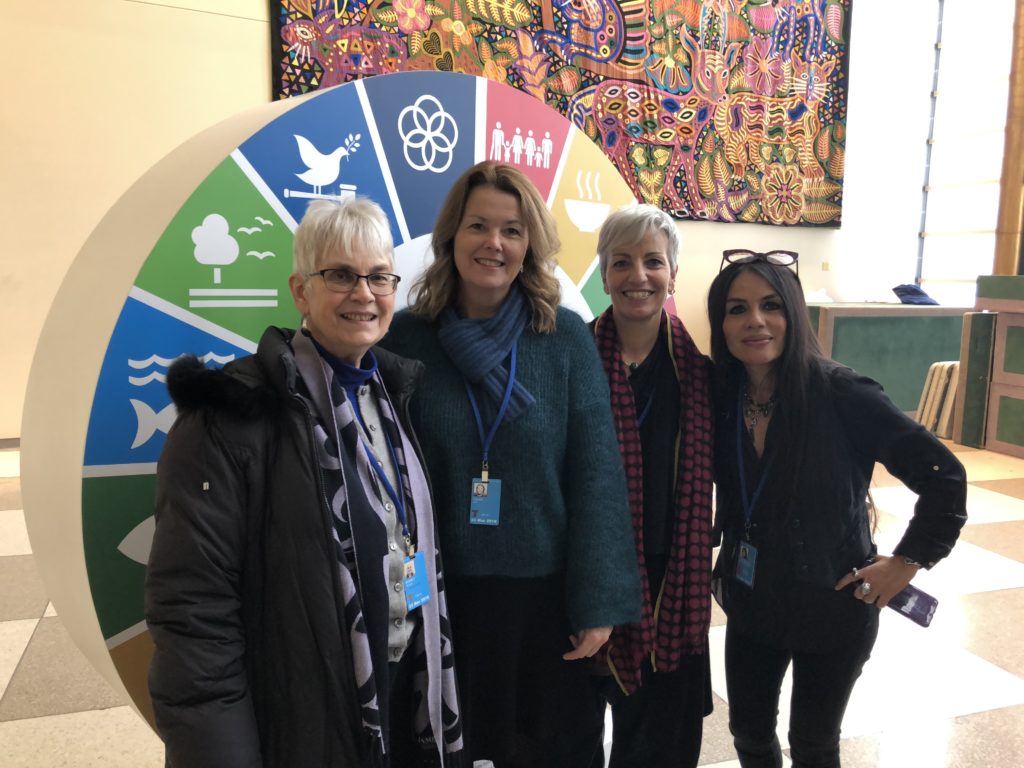New book edited by Maria Edström and Monika Djerf-Pierre in collaboration between several members of our UniTWIN and other prominent international scholars in the field of gender and media:
Comparing Gender and Media Equality Across the Globe: A Cross-National Study of the Qualities, Causes and Consequences of Gender Equality in and Through the News Media.
The book is available as open access here:
https://www.nordicom.gu.se/sv/publikationer/comparing-gender-and-media-equality-across-globe
and the dataset can be found here:
https://www.gu.se/en/research/gemdataset
Special issue of the Q1 journal ‘Comunicar: Media Education Research Journal
Franciso Jose Garcia Ramos, Sole Vargas, and Alex Wake, members of the UNESCO UniTWIN on Media, Gender and ICTs have co-edited a special issue of the Q1 journal ‘Comunicar: Media Education Research Journal’ . This issue is titled: Gender Equality, Media and Education: A Necessary Global Alliance. It is a project of the network.
Full English version free download: https://www.revistacomunicar.com/pdf/comunicar63-en.pdf
Full Spanish version free download: https://www.revistacomunicar.com/pdf/comunicar63.pdf
Link current issue: https://www.revistacomunicar.com/index.php?contenido=revista&numero=actual&idioma=en
UniTWIN member Edgar Vega Suriaga works with his institution to develop a new course
MASTER’S DEGREE IN GENDER AND COMMUNICATION
The Communication Area of the Universidad Andina Simón Bolívar, Sede Ecuador, invites you to apply online for the Master in Gender and Communication from May 21th to June 12th.
The Master in Gender and Communication is an unprecedented research postgraduate degree in the country and the region, whose call is international. Its object of study is the cultural patterns that sustain the asymmetries of power between the genders and that are configured and reproduced in processes of meaning and representation of gender in communicational and media fields; the fictional construction of gender violence in the media and in the processes of media reception; the social uses of the media and ICT; the gender differential in the organizational structures of the media; and, the political agency for women and gender / gender diversity in the media and in communication processes, and its influence on public opinion. The master classes start in October 2020; it is organized within the framework of the UNITWIN Network on Gender, Media and ICTs of UNESCO; its call is both nationally and internationally; it has a teaching staff of the highest academic level and expertise in the fields of gender and communication; and it will have a series of financial support for those who apply.
To interested persons, we inform you of the following calendar.
Online registration: from May 21 to June 12, 2020
Registrations: from 7 to 18 September, 2020
Classes start: October 5, 2020
For more information, please view:
Or write to us:
laura.barriga@uasb.edu.ec; monica.vargas@uasb.edu.ec; admisiones@uasb.edu.ec
Free Resource developed by UniTWIN members Claudia Padovani and Karen Ross
All the AGEMI resources are free to stream or download although the learning units require a one-time registration which is basically your email address.
UniTWIN MEMBERS CONTRIBUTE TO THE FUTURES OF EDUCATION INITIATIVE
UNESCO has established an International Commission on the Futures of Education (https://en.unesco.org/news/contribute-futures-education-initiative). The initiative was launched in September 2019 at the UN in New York.
The objective of the Commission is “to reimagine how knowledge and learning can shape the futures of humanity in a context of increasing complexity, uncertainty and precarity. From climate change to growing inequalities, artificial intelligence to learning outcomes, UNESCO wants to respond to challenges, as well as opportunities that will impact the education and well-being of future generations.”
The Commission released a book at the first meeting on 28 January, 2020.
Several members of the UniTWIN for Gender, Media and ICTs have a chapter in the book:
- French, Lisa. & Poole, Mark. 2020. ‘New Competencies for Media and Communication in an AI Era’ in Humanist Futures: Perspectives from UNESCO Chairs and UNITWIN Networks on the futures of education. Paris, UNESCO, pp.136-140.
- Padovani, Claudia. & Ross, Karen. 2020. ‘Ideas for gender-transformative futures of education in the digital age’ in Humanist Futures: Perspectives from UNESCO Chairs and UNITWIN Networks on the futures of education. Paris, UNESCO, pp. 153-160.
- Link: https://unesdoc.unesco.org/ark:/48223/pf0000372577?posInSet=1&queryId=4253f7a0-a9bf-4e2f-b0f8-28cca0bc9384
A DAY FOR TEACHERS, JOURNALISTS AND NGOs
Get the latest on UNESCO’s gender and equality initiative for journalism educators
Alex Wake and Lisa French presented ‘Get the latest on UNESCO’s gender and equality initiative for journalism educators‘ at the Journalism, Education and Research Association of Australia conference (JERAA) on December 11, 2019.
UniTWIN International meeting September 11 and 12, Alicante
The UniTWIN International Meeting; “Resignification in the field of gender; a commitment to information, communication and responsible education” was held at the University of Alicante on September 11th and 12th , 2019.
Rosa Torres reported that the meeting was a fantastic experience.
In this link you can see videos of the conference and photos!
https://www.unitwinalc19.ua.
The report can be downloaded here: REPORT UniTwinALC
Further details will be available soon.
The Alicante team are preparing e-book with the final declaration of ALICANTE UNITWIN 2019, ABOUT GENDER RESIGNIFICATION.
NEW PUBLICATIONS
UNESCO has just announced two new publications from GAMAG and the UniTWIN network.
They are available here:
https://en.unesco.org/gamagandunitwin
They are Setting the Gender Agenda for Communication Policy and Gender, Media and ICTs: two publications to foster gender equality in the media and in journalism education.
NEXT NETWORK MEETING
The next meeting of the members of The UniTWIN Network of Media Gender and ICTs is being held between July 4 and July 8, 2019 in Madrid, Spain. It is joined to the IAMCR Conference (July 7-11), a pre-conference (July 5th) and the General Assembly GAMAG (July 8th).
Meeting Schedules (all at Universidad Complutense de Madrid)
4th of July 2019
UniTWIN Network on Gender Media and ICTs annual meeting:
Facultad de Ciencias de la Información. Universidad Complutense.
Building: Main Building Room: Sala de Profesores del Decanato.
5th of July 2019
Pre-conference on Actualizing Section J
9 -13.30: Facultad de Ciencias de la Información de la Universidad Complutense de Madrid – Sala Naranja (Orange Room)
3pm-5.30pm Facultad de Ciencias de la Información de la Universidad Complutense de Madrid – Sala de Profesores del Pasillo del Decanato
https://iamcr.org/madrid2019/actualizing-section-j
6th of July 2019
IAMCR Preconference activity July 6: The future of media monitoring: Comparing Gender and Media Equality Across the Globe
https://iamcr.org/madrid2019/future-media-monitoring
7th of July 2019
IAMCR conference 7th– 11thJuly
8th of July 2019
Global Alliance on Media and Gender (GAMAG) General Assembly 4-5.30pm Location TBA.
8th of July 2019
Second meeting time for the UniTWIN Network
Facultad de Ciencias de la Información. Universidad Complutense.
Building: Main Building Room: Aula 302
SPECIAL JOURNAL ISSUE FROM THE NETWORK
The Network is pleased to announce a special issue of the InterdisciplinaJournal (Vol. 7, No. 17, January 2019).The issue aims to promote the objectives of the UNESCO UniTWIN in Gender, Media and ICTs. It is available online at:
http://www.revistas.unam.mx/index.php/inter/issue/view/5093
CONFERENCE PRESENTATION
Francisco José García-Ramos presented a paper at the 1st International Conference of University Teaching with a Gender Perspective: Challenges and Innovation (24th – 25th October, 2018 University of Valencia, Spain).
The paper, titled “Subjects with a gender perspective in the Communication BA in Spain. A vision for the implementation of the UNESCO-UniTWIN New Syllabi” presented the UNESCO project ‘Mapping Educational Strategies for Creating Gender-sensitive Journalism, Media and ICT Curriculums’, and the UniTWIN workshop celebrated in San José (Costa Rica) in April 2018.
In addition to this, the paper illustrated the presence of the subjects within a gender perspective in Communication BAs in the Spanish universities and how the UNESCO-UniTWIN New Syllabi can be an excellent model to modify or create new subjects regarding to the upcoming changes in the Spanish BA and MA curricula in the EEES framework.
The paper informed about the index and the methodological approaches of the New Syllabi as well as its forthcoming publication for the knowledge of the Spanish university community.
FOSTERING GENDER-SENSITIVE JOURNALISM ACROSS THE WORLD
UNESCO have published a story on the work undertaken in Costa Rica. Please find a link to the news story here:
The UniTWIN Network for Gender, Media and ICTs brings together 19 universities to promote gender equality in and through media on a global scale through research, education and participation. The Network is uniquely placed to develop a truly intercultural and globally relevant curriculum, co-operating among countries and regions to bring together research and effective education, To organize this cooperation project, members of the UniTWIN met at Universidad de Costa Rica in San José on April 18-20, 2018.
COMMISSION ON THE STATUS OF WOMEN AT THE UNITED NATIONS HEADQUARTERS
Members of the UNESCO Gender, Media and ICTs UniTWIN attended the sixty-second session of the Commission on the Status of Women (CSW) at the United Nations Headquarters in New York (12-23 March 2018).
CSW is the principal global intergovernmental body exclusively dedicated to the promotion of gender equality and the empowerment of women (http://www.unwomen.org/en/csw), and this is the most important meeting for the UN level human rights agenda. The key review theme this year was: ‘Women and media’.
A position paper was drafted on behalf of the UniTWIN and this is soon to be published in a UNESCO book (Gender Mainstreaming in Journalism and Communication Schools). UniTWIN members took the opportunity to influence the direction, debates and outcomes of the 2018 Commission on the Status of Women in regard to women and media, and the teaching of media, communication and journalism globally.
MEETING OF THE NETWORK & OPEN PUBLIC FORUM APRIL 18-20, 2018
The next meeting of the UNESCO UniTWIN Network will be held in San José, Costa Rica, April 18-20, 2018. The Venues are UNESCO Central America building and the University of Costa Rica.
The UNITWIN members will gather in a Network members meeting on April 18- 19. A forum open to the public will be held in April 20, in a full day event at the University of Costa Rica auditorium.
The audience will be students, professors, media professionals, NGO’s, and regional organizations – UN system members. The theme is to be announced.
The previous meeting of The Media, Gender and ICTs University Network was held on April 25-28, 2017 at RMIT Europe, located in Barcelona (the European branch of the Australia-based RMIT university).
RMIT Europe
C/Minerva, n 2
8006 Barcelona
SPAIN
Tel: +34 93 547 77 00
Web: www.rmit.edu.au
Please see the RMIT Europe Intranet site for visitor information, including practical information about accommodation, transport, etc: https://sites.google.com/a/rmit.edu.au/rmit-europe-intranet/about/visit-rmit-europe
The Agenda for the Barcelona meeting was to:
- develop, finalize and adopt a four-year Global Plan of research activities for the University Network on Gender, Media and ICTs. This will be linked to advancing the research vision on Media Scholarly Agenda for the Global Alliance on Media and Gender (GAMAG), published by UNESCO and IAMCR (International Association for Media and Communication)
- define research activities linked to policy development to be achieved by this Network
- advance the research vision on Media Scholarly Agenda for the Global Alliance on Media and Gender (GAMAG), published by UNESCO and IAMCR (International Association for Media and Communication)
- define education activities to be fostered by the Network
- examine ways in which the network might be funded: research grants, institutional options and other funding opportunities to sustain the Network
- develop projects that members can work on together in line with the agenda of the Network
- identify new members to be invited into the Network: individual scholars, organisations (including media), NGOs, government, etcetera.




